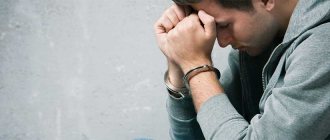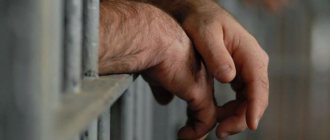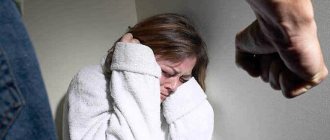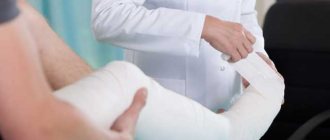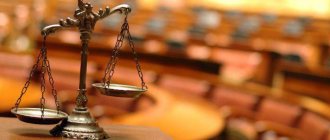Crimes are not always committed with malicious intent (part of the composition). Some violations of the law occur unintentionally. They are described in paragraphs of the Criminal Code (CC) of the Russian Federation along with intentional offenses. However, they have some limitations in terms of composition. Thus, the article of the Criminal Code of the Russian Federation for causing harm to health by negligence is applied if the victim is seriously injured (grievous harm).
Download for viewing and printing:
Criminal Code of the Russian Federation of June 13, 1996 N 63-FZ
Composition of the act
The following consequences of the offense are understood as careless infliction of grievous harm to the body of the victim:
- onset: blindness;
- deafness;
- persistent mental disorder;
- body parts (legs or hands, for example);
A feature of a criminal offense in this case is considered to be the absence of intent . That is, the criminal did not foresee (or could not do so) the grave consequences of his active actions or inaction.
Important: only a qualified specialist – a doctor – can determine the level of health loss. Hint: signs of serious damage to the body are given in Article 111 of the Criminal Code. When considering an unintentional violation of the law, they rely on them. Download for viewing and printing:
Article 111. Intentional infliction of grievous harm to health of the Criminal Code of the Russian Federation
Object and Subject
The object of injury due to negligence is human health. The victim can be any individual.
The subject of a criminal act is a capable person, aged 16 years and above (paragraph 20 of the Criminal Code). Adolescents (from 16 to 18 years old) who are diagnosed with mental retardation are exempt from liability. They are not fully aware of the results of their actions.
Article 20. Age at which criminal liability of the Criminal Code of the Russian Federation begins
Attention: minors are also subject to punishment for involuntarily causing grievous harm.
Objective and subjective side
When qualifying an act, the court is obliged to fully characterize the actions of the accused. For this purpose, criminology uses the characteristics of a crime. These in this case include:
- The objective side is expressed in the act of the accused, which led to serious consequences for the victim. An action can be active (action) or passive (inaction). It is important that its result was a result leading to criminal prosecution. For example, a person decided to throw a heavy object from the balcony in order to save energy and time. He checked to see if there were any pedestrians below, but as a result the object fell on a child who suddenly ran out onto the path.
- The subjective side is characterized by a lack of intent. An important point in the investigation is the search for evidence that the accused could have foreseen the consequences. In the case of the balcony, the person had to think about the accidental appearance of a child at the place where the load fell. A criminal act is recognized if the consequences were foreseen. That is, the criminal showed negligence or frivolity, relying on luck.
Please note: injuries caused by unforeseen circumstances are not considered a criminal offence. Such an incident is also called an incident.
Qualification
Criminal offenses are divided into ordinary and qualified . For their commission, the paragraphs of the Criminal Code provide for various punishments. The second paragraph of Article 118 contains the following qualifying feature - committed by a person performing professional duties.
Article 118. Causing grievous bodily harm by negligence of the Criminal Code of the Russian Federation
Attention: while performing duties, the specialist must comply with safety requirements. An accident is evidence of negligence in relation to the requirements of labor safety standards.
For example, representatives of the following professions will be judged based on their qualifications:
- military personnel;
- civil servants;
- builders;
- manufacturers of goods and others.
Article 118. Causing grievous bodily harm through negligence
Resolution of the Supreme Court of the Russian Federation dated August 24, 2017 N 81-UD17-8, convicted under Part 1 of Art. 118 of the Criminal Code of the Russian Federation to 1 year 6 months of restriction of freedom, with the establishment on the basis of Art. of the Criminal Code of the Russian Federation restrictions and the imposition of duties listed in the verdict. The sentence was not reviewed on appeal.
Determination of the Judicial Collegium for Criminal Cases of the Supreme Court of the Russian Federation dated November 20, 2018 N 72-UD18-14
Part 1 Art. 118 of the Criminal Code of the Russian Federation to 1 year 6 months of correctional labor, part 1 of Art. 222 of the Criminal Code of the Russian Federation to 4 years in prison, on the basis of Part 2 of Art. The Criminal Code of the Russian Federation for the totality of crimes by partial addition of punishments finally imposed 5 years and 6 months of imprisonment to be served in a penal colony.
Appeal ruling of the Judicial Collegium for Criminal Cases of the Supreme Court of the Russian Federation dated July 16, 2019 N 88-APU19-5sp
In the appeal, lawyer Grishanova E.I. asks to change the sentence due to incorrect application of the criminal law, violation of the criminal procedural law and excessive severity. According to the lawyer, taking into account the circumstances established by the jury’s verdict, the actions of Ivankova T.F. should be qualified under Part 1 of Art. 109 of the Criminal Code of the Russian Federation, Part 1, Art. 118 of the Criminal Code of the Russian Federation. At the same time, the lawyer draws attention to the fact that the court, in support of the conclusion about the qualification of Ivankova’s actions and intent to kill, refers to circumstances not established by the jury’s verdict, namely the use of flammable material - gasoline, a small area of the room, enclosed space, and the absence of other exits from the trailer. Also, according to the defense lawyer, the conclusion that I. could not help but feel pain is based on assumptions.
Appeal ruling of the Judicial Collegium for Criminal Cases of the Supreme Court of the Russian Federation dated August 28, 2019 N 66-APU19-15
Lawyer Ismailov A.Yu. in the interests of the convicted Novozhilov A.N. indicates that the verdict against the defendant is based on assumptions and is not supported by reliable evidence. Novozhilov’s participation in the criminal community has not been proven, and the fact of his everyday communication with Zakharov and Kashnikov was erroneously assessed by the court as a crime. The trial in the case was conducted one-sidedly, with an accusatory bias, and the arguments of the defendants in their defense were not actually verified by the court or were simply ignored. The testimony of the victim G. is extremely contradictory, and, on the contrary, Novozhilov’s testimony throughout the entire preliminary investigation and at the trial was always stable, consistent and consistent with the case materials. In addition, during the preliminary investigation G. did not mention Novozhilov’s last name, but spoke about R., and in court he stated that a man named “R.” and "A." allegedly is the same person, although from his testimony at the court hearing it is clear that these are different persons, and they came to him at different times and in different compositions. The identification of Novozhilov carried out at the court hearing does not meet the requirements of Art. Art. 193, 289 Code of Criminal Procedure of the Russian Federation. Moreover, during the preliminary investigation of G., photographs of persons suspected of a crime were presented for identification, and this evidence was recognized as inadmissible evidence, and the law does not provide for the possibility of repeated identification of the same person. There is also no evidence in the case that Novozhilov acted as part of an organized group, and the victim G. did not confirm this conclusion of the court. Regarding the episode of causing grievous harm to V.’s health, the court did not take into due account Novozhilov’s testimony that it was he who was attacked by P. and, brushing him off, he could inadvertently hit V. on the head with a stick, who at that time was in a state of alcohol intoxication. He asks Novozhilov under paragraph “a” of Part 3 of Art. 163 and part 2 of Art. 210 of the Criminal Code of the Russian Federation to justify and re-qualify Novozhilov’s actions in the episode in relation to V. under Part 1 of Art. 118 of the Criminal Code of the Russian Federation.
Appeal ruling of the Judicial Collegium for Criminal Cases of the Supreme Court of the Russian Federation dated 09/03/2019 N 56-APU19-15SP
Art. 118 part 1 of the Criminal Code of the Russian Federation for a period of 1 year 10 months, on the basis of Art. Part 2 of the Criminal Code of the Russian Federation by partial addition of punishments - for a period of 2 years 10 months with the imposition of the obligation to appear at a specialized state body supervising the serving of sentences in the form of restriction of freedom, 4 times a month for registration and with the establishment of restrictions: to stay at home at night time of day from 22 to 6 o'clock, without the consent of a specialized government body, do not change your place of residence or stay, do not travel outside the municipality of the Bolshoi Kamen urban district of Primorsky Krai.
Resolution of the Supreme Court of the Russian Federation dated October 31, 2019 N 18-UD19-100
By the resolution of the Presidium of the Krasnodar Regional Court dated June 19, 2022, the verdict of the Abinsky District Court of the Krasnodar Territory dated July 5, 2022 and the appeal ruling of the judicial panel for criminal cases of the Krasnodar Regional Court dated August 30, 2022 in relation to Lagoda P.I. changed. It was decided to terminate the criminal case against P.I. Lagoda. according to Part 1 of Art. 118 of the Criminal Code of the Russian Federation on the basis of clause 3, part 1, art. 24 of the Code of Criminal Procedure of the Russian Federation, due to the expiration of the statute of limitations; reclassify the actions of Lagoda P.I. from clause “c”, part 4, art. 162 of the Criminal Code of the Russian Federation at paragraphs “a”, “g”, part 2 of Art. 161 of the Criminal Code of the Russian Federation (as amended by the Federal Law of the Russian Federation of December 8, 2003), according to which a sentence of 4 years and 8 months of imprisonment to be served in a general regime correctional colony is imposed.
Cassation ruling of the Judicial Collegium for Criminal Cases of the Supreme Court of the Russian Federation dated November 28, 2019 N 18-UD19-100
By the resolution of the Presidium of the Krasnodar Regional Court dated June 19, 2022, the verdict of the Abinsky District Court of the Krasnodar Territory dated July 5, 2022 and the appeal ruling of the judicial panel for criminal cases of the Krasnodar Regional Court dated August 30, 2022 were changed. It was decided to terminate the criminal case against P.I. Lagoda. according to Part 1 of Art. 118 of the Criminal Code of the Russian Federation on the basis of clause 3, part 1, art. 24 of the Code of Criminal Procedure of the Russian Federation, due to the expiration of the statute of limitations; reclassify his actions from clause “c” of Part 4 of Art. 162 of the Criminal Code of the Russian Federation at paragraphs “a”, “g”, part 2 of Art. 161 of the Criminal Code of the Russian Federation (as amended by the Federal Law of the Russian Federation of December 8, 2003), according to which a sentence of 4 years and 8 months of imprisonment to be served in a general regime correctional colony is imposed.
Cassation ruling of the Judicial Collegium for Criminal Cases of the Supreme Court of the Russian Federation dated January 29, 2019 N 11-UD18-40
convicted under Part 1 of Art. 115 of the Criminal Code of the Russian Federation to 400 hours of compulsory work, under Part 1 of Art. 118 of the Criminal Code of the Russian Federation to restriction of freedom for a period of 2 years 1 month, in accordance with Part 2 of Art. of the Criminal Code of the Russian Federation to restrict freedom for a period of 2 years 1 month, with the establishment of the restrictions listed in the sentence.
Determination of the Constitutional Court of the Russian Federation dated June 27, 2017 N 1437-O
Implementing these powers, the legislator established, in part two of Article 118 of the Criminal Code of the Russian Federation, criminal liability for causing grievous harm to health through negligence, committed as a result of improper performance by a person of his professional duties. This provision does not contain any legal uncertainty in the aspect raised in the applicant’s complaint and, therefore, does not violate his constitutional rights.
Cassation ruling of the Judicial Collegium for Criminal Cases of the Supreme Court of the Russian Federation dated July 2, 2020 N 32-O20-1
Stashkov Alexander Dmitrievich, ..., previously convicted on November 19, 2007 under Part 1 of Art. 118 of the Criminal Code of the Russian Federation to 1 year 3 months of correctional labor with deduction of 15% of earnings monthly, the punishment was served in connection with the crediting of time served in custody in the case from June 16 to November 19, 2007,
Appeal ruling of the Judicial Collegium for Criminal Cases of the Supreme Court of the Russian Federation dated 01.08.2017 N 31-APU17-2
convicted under Part 1 of Art. 118 of the Criminal Code of the Russian Federation to 2 years of restriction of freedom with the imposition of restrictions and obligations listed in the sentence; according to clause “a”, part 2 of art. 116 of the Criminal Code of the Russian Federation (as amended by Federal Law of December 7, 2011 N 420-FZ) to 1 year of restriction of freedom with the imposition of restrictions and obligations listed in the sentence.
Punishment
Measures of influence on a criminal guilty of unintentionally causing grievous harm are given in paragraph 118 of the Criminal Code. They are listed in the table below.
| Type of punishment | Type of crime | |
| Ordinary | Skilled | |
| Fine (thousand rubles) | 80.0 or income for six months | — |
| Mandatory work (hours) | 480 | — |
| Correctional work (years) | 2 | — |
| Restriction of freedom (years) | 3 | 4 |
| Arrest (months) | 6 | — |
| Forced labor (years) | — | 1 |
| Deprivation of the right to engage in activities (years) | — | 3 |
| Deprivation of liberty | — | 1 |
Hint: the table shows the maximum penalties.
Commentary to Art. 118 of the Criminal Code of the Russian Federation
The direct object of the crime is human health.
The elements of the offense are material, since liability occurs after the fact of a negative consequence is established. There cannot be a formal violation related to preparation for the commission, since the law speaks of unintentionality.
To impose punishment, the offender must be sane. The age of prosecution is 14 years.
The objective side of a crime is characterized by a cause-and-effect relationship between a person’s act and the injury caused. A striking example of criminal inaction is a dog attacking a passerby when the owner did not give the necessary command or force the animal to retreat.
The main difference between causing grievous harm by negligence and the provisions of norm 111 of the Criminal Code of the Russian Federation is the absence of direct intent. It is the subjective side that will be the most important sign of a violation committed.
The presence or absence of a plan depends on:
- the severity of the offense;
- amount of punishment.
During a quarrel, a citizen pushed his opponent, the victim could not stay on his feet, fell and hit his head on a large stone. If during the push the perpetrator shouted “Die!”, then the court recognizes that he caused the damage intentionally. This is what the investigation will be based on in the future. It is almost impossible to prove in court that there is no desire to harm.
